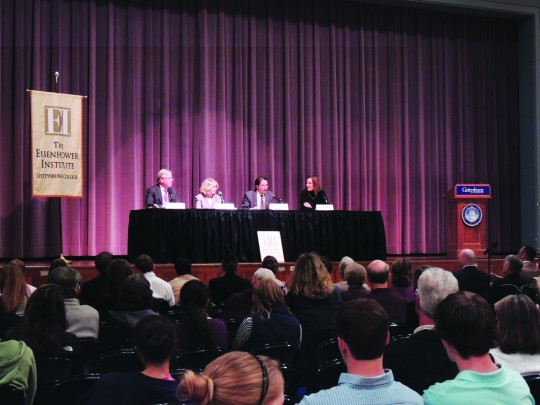Nationally acclaimed journalists discuss the election

Journalists Howard Fineman, Lynn Sweet, Carl Cannon and Christi Parsons discuss the upcoming election. (Photo by Christina Bassler)
By Bethany Foxx, Staff Writer
On Thursday, Oct. 25, a panel of journalists gathered in the CUB Ballroom to discuss the upcoming presidential election. The discussion, “Assessing the 2012 Election: A View from the Media,” was offered by the Events and Coordinating Committee (EPACC) and co-sponsored by the Department of Political Science and the Eisenhower Institute.
The panel consisted of national correspondents, including Carl Cannon of RealClearPolitics, Howard Fineman of the Huffington Post, Christi Parsons of the Chicago Tribune and Los Angeles Times and Lynn Sweet of the Chicago Sun-Times. Cannon is currently a part-time professor at Gettysburg College, teaching a presidency course with Political Science professor Shirley Warshaw this fall.
Cannon moderated the panel and posed questions to the other journalists throughout the discussion.
He opened with the quetions, “How does Obama [this election] compare to [Obama in] 2008?”
“In 2008 it felt like he was going to win and the collapse to the economy began. The biggest difference is that it’s not clear who is going to win,” Sweet said.
Parsons followed, saying, “Every poll seems to say something new about the race. It’s going to come down to a few key states and the few key people in those states…everything is getting related back to the economy.”
Fineman went on to discuss the nine battleground states: Nevada, Colorado, Iowa, Michigan, Wisconsin, Ohio, New Hampshire, Virginia and Florida.
“It’s not just about the states, it’s about the specific voters in those states,” he said. “The candidates are appealing to people through the media, especially social media.”
Cannon noted that these battleground states contain many undecided voters.
“Some people believe the election will result of who turns out the bigger base,” Parsons said. She discussed how “jokes” that the candidates make are an appeal to voters, and their subsequent reactions can actually serve as a voting indicator.
“Jokes can communicate and motivate…especially going into a base turnout phase.” The bayonets comment Obama made during the final Presidential debate is an example of one of the “jokes” that can determine a persons political leanings, in terms of whether they found the remark humorous or not.
The panel then deliberated the role of government and the Electoral College. Cannon talked about federalism (the power and relationship between the states and the federal government), saying that the two nominees see it very differently.
“All issues are not equal,” Sweet said. “It is hard for any candidate to get anything across in a simple way. There’s a view in politics that when you are explaining, you are losing.”
Parsons then commented on women’s role in the election.
“Many women have to weight their feelings about pocketbooks and healthcare and reproductive rights,” she said.
Fineman then addressed what will occur after the President is elected. He said that in a lame duck session we will have to wait to find out about taxes and the scheduled automatic tax cuts at the end of the year.
Cannon then asked the panelists, “What party is well suited to win the election (in respect to Ohio)?” Sweet said that it is difficult to call because of state issues. For example, when Obama talks energy, some states think solar, whereas other states think fracking or coal-powered energy.
“The states are battlegrounds because of the diverse interests…each state has unique issues and there’s more focus right before the election,” Sweet said.
The panel then addressed why Romney chose Paul Ryan as his running mate, when many people thought that Marco Rubio, a United States Senator from Florida, would be a strategically good pick for the republican ticket. Fineman mentioned that Romney could win Florida without Rubio, but he could not win the Midwest without someone like Ryan. Sweet added that Ryan went to school in Ohio, which would also help Romney in that battleground state. No republican has won the White House without Ohio since around the election of President Lincoln.
After spending about 50 minutes discussing these and other issues, the panel concluded with an audience question and answer session.
